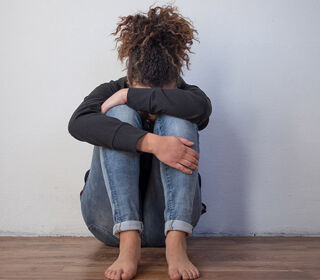
Blog

Life as a research student can be unpredictable, with some situations putting a strain on your mental health. PhD student, Karolina Biernat has faced a number of personal and professional challenges that have affected her student wellbeing, but found the mental health support she needed to overcome it.
The changing focus of a research student
Karolina’s research looks at the Holiday Kitchen programme, which provides healthy food and educational activities to families that need it most.
Set up by Accord Housing Association, Holiday Kitchen has been designed to help families during the long summer holidays, ensuring they learn about and eat healthy meals, enabling them to return to school physically healthy and mentally sharp.
Karolina arrived with a background in nutrition, but soon discovered she’d have to change her entire discipline.
“When I submitted my proposal, the research was very quantitative and looked at the nutritional science aspects,” she says.
“I wanted to go in, measure BMIs, and assess what participants were eating at the beginning, during and end of the programme.”
However, her first visit to one of the kitchens made her realise such research would not be possible.
“Holiday Kitchen programmes are naturally quite hectic – there’s a limited number of staff due to limited funding, but there are over 30 participants,” Karolina explains.
“Staff must manage this while cooking two meals a day. The participants had, by this point, also filled out evaluation forms. I realised if I came in with a whole new set of forms and questions, it just wouldn’t work.”
Further changes
Karolina’s research changed again, this time moving towards more interactive methods. However, further shifts were on their way.
“During my first-year progress review, the panel felt the study I wanted to do didn’t have enough of a theoretical background, which meant I once again had to revaluate,” she explains.
“One of my supervisors left the University and their replacement had a background in sociology, who persuaded me to push my research into that area.”
Student mental health concerns
Over the course of just a few months, Karolina had changed her research idea, her research disciplines and her supervisors.
All of these dramatic shifts – as well as the daunting prospect of repeating her first year of study – began to really affect Karolina’s student wellbeing.
To make matters worse, Karolina suffered a personal tragedy, with her grandfather sadly passing away.
“It all happened simultaneously,” Karolina explains. “It was very overwhelming, and I didn’t know how to cope with it. I took a month off and headed home to Poland to attend my grandfather’s funeral and stay for Christmas.
“When I returned all my work was waiting for me. I was falling behind, and on top of that I was having to learn everything about sociology. Furthermore, I was still waiting for the results from my review resit, so I wasn’t even sure if I’d be able to carry on with my research, anyway.”
Opening up
Karolina tried to keep a brave face, but a meeting with her supervisor saw her façade shatter.
“I’d been putting a mask on, pretending I was fine when I wasn’t,” Karolina says. “While talking to my supervisor about my work, I just burst into tears.
“I spoke to him about my problems and from that point on, things changed. They were aware of what had been going on, but they didn’t realise just how much it was affecting me.”
Enlightening mental health support
Karolina’s supervisors gave her the time and support she needed to get back on her feet, but it was the help of the BCU Mental Health Team that she feels truly made a difference.
“Meeting with them was the real turning point,” she says. “I received one-on-one support and spoke to someone in a non-judgemental environment. They really understood the academic side of things.”
When it comes to feelings of stress and anxiety, Karolina believes every research student should be open about their struggles.
“Even if it’s only a small feeling, tell your supervisors. As soon as they are made aware, they will help you,” she says.
“I would strongly recommend the BCU Mental Health team. They helped me work through things I didn’t even realise were related to my situation.”
If you are struggling with your mental health, email wellbeing@bcu.ac.uk to book a face-to-face appointment.